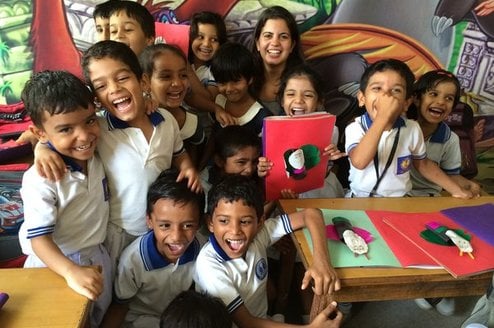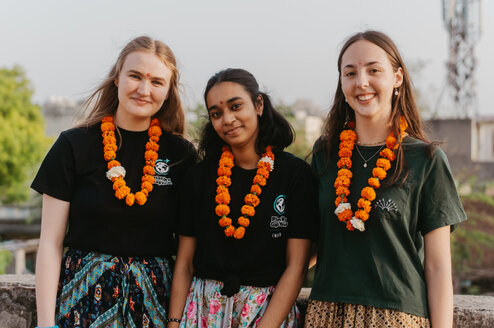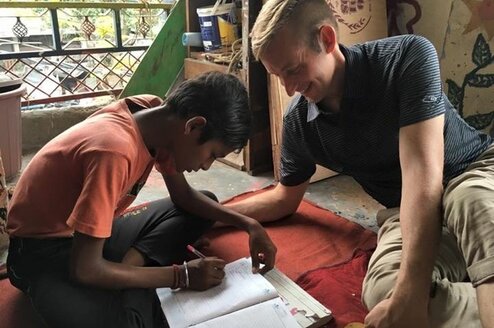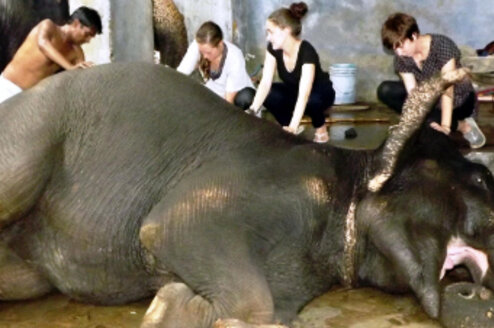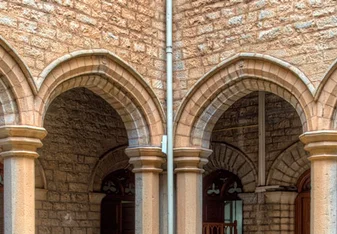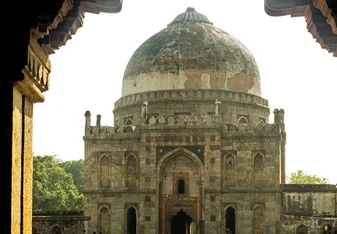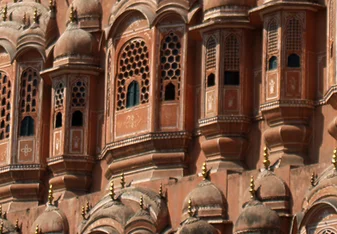Volunteer in Mumbai, India
Volunteer Programs in Mumbai
About
Mumbai is a glorious city, full of glamor and culture and history -- and of course, Bollywood!
Mumbai is also a city bursting at the seams, with serious problems that make life very difficult for many of its residents. By volunteering in Mumbai you get the chance to experience the wonderful side of the city and also help out with valuable projects aimed at improving the lives of women, children, and the poor and needy.
If you have any specific skills -- such as teaching qualifications, medical training, or social work -- these can be put to particularly good use in Mumbai, as skilled volunteers are always sought after. There are many local organizations and skilled locals in India and Mumbai in particular who work with the disadvantaged. If you come with an open mind, and the aim of helping local organizations rather than teaching them, you can have a very rewarding volunteer experience in Mumbai.
Project Types
When choosing a volunteering program, it's important to consider where your strengths and skills lie, so you can be a genuine asset to an organization, rather than a further drain on limited resources. Taking volunteers on board can be quite an investment of time, especially for small charities, so choose wisely and you'll be able to do the most good.
Human Rights & Trafficking
Mumbai is a center of trafficking in women and children from around India and Nepal, and many end up in sex work. There are several organizations working to end trafficking, raise awareness about it, rehabilitate women who have left, and care for/educate children growing up in the red-light district.
Slum Charities, Community Building & Microenterprise
Mumbai has the dubious honor of being home to the largest slum in the world, Dharavi. While worthy life and enterprises take place here, it is undeniably an unhealthy and insecure place to live, and many charities work with slum dwellers to improve their lives and access to facilities. Projects that volunteers can get involved in include schools and clinics, as well as microenterprise organizations.
Early Childhood Education
Not all of Mumbai's children have the same access to education, and without education, many kids from low-income families risk being unable to pull themselves out of poverty. If you have teaching skills, there are opportunities in Mumbai to work with children in pre-schools and after-school centers.
Planning Your Trip
A few practical considerations will help your stay in Mumbai run smoothly and incident-free.
Housing & Accommodation
Many organizations expect you to cover the cost of housing yourself, as it would be a drain on their resources to provide these for you. However, many will be able to help with locating appropriate places to stay.
Mumbai is full of hotels and guesthouses that cater to every budget (although good cheap places are quite hard to come by). The YMCA and YWCA guesthouses offer safe, no-frills accommodation (usually with breakfast included), which can be a better option for a long-term stay than a hotel. Individual organizations may be able to help you find a homestay.
Language Requirements & Tips
Marathi is the local language of Mumbai and the state in which it's situated, Maharashtra. (This may come as a surprise, as Mumbai is also home to the Hindi-language film industry, Bollywood). Marathi is similar to Hindi and is written in the same script. But, Indians from all over the country call Mumbai home, and you'll find Hindi, Urdu, Tamil, Bengali, and other Indian languages are widely spoken.
English is also widely spoken, even as a first language by many educated people, but people belonging to lower classes or with lower education will often not speak or understand English. When volunteering, don't expect the people with whom you are working to understand English. But you can rely on most people in positions of authority to do so.
Packing Tips
Mumbai has a hot climate; it's hot and wet in the summer months (and sometimes floods), and is still pleasantly warm in the winter. It's best to wear loose cotton clothes to be able to better manage the heat and humidity.
While Mumbai is one of the more liberal Indian cities, and you will find women wearing all kinds of things, it's still generally a good idea to dress conservatively so as not to offend more traditional people and so you are better able to move around as inconspicuously as possible. It's best not to wear shorts or skirts shorter than knee length, and don't bare your cleavage. You will generally be fine showing your shoulders in Mumbai, but always carry a loose scarf with you that you can use for extra modesty, should you feel you need it (or if entering religious sites).
Appropriate clothing can be picked up very cheaply in India, so there's no need to go overboard with the packing.
Costs in Mumbai
Mumbai is the most expensive city in India, and although you're still likely to find things like eating out and transport to be good value, don't expect to get rock-bottom accommodation or nights out, as you might elsewhere in India.
Visas to India
Depending on your nationality, getting an Indian visa can be quite a long and involved process. Citizens of select countries can get tourist visas on arrival after pre-registering online; citizens of certain other countries (the U.K.) have to pay a much higher fee than others; and some people will need to apply in person at their nearest Indian embassy (or by mail). Make sure to check the requirements for your citizenship well in advance of your travel date so you aren't caught by surprise.
Although you'd need a work visa to work in India, volunteer work is usually short-term, so it's advisable to simply apply for a tourist visa.
Health & Safety
The key to enjoying India is to not be paranoid about your health or safety. Generally, any sickness or danger you encounter will be minor and hardly any different from any other travel destination (your home country included!) Having said that, there are some precautions you can take to make your stay in Mumbai more comfortable.
Health
Mumbai is a hot and humid city with poor infrastructure. It's likely you'll get Bombay belly at some point, despite your best efforts, simply because the food and water hygiene may not be up to the standards you're used to at home. Don't obsess over it, but make sure to practice good food hygiene (only eating at busy places, avoiding uncooked salads/fruit that may have been washed with questionable water) and have some stomach medicine on hand that you can use in case you're afflicted.
Mosquito-born diseases, rabies, and hepatitis can be a problem in Mumbai. It's wise to be vaccinated against these where possible, or take drugs to prevent you from being infected. Discuss your needs with a travel doctor well in advance of your departure.
Medicines can be bought very cheaply and easily over the counter in India. Sometimes these are counterfeit, but they are usually fine. If you need to take any specific medicine, you should bring it with you. For everyday items like painkillers or stomach medicine, you can pick these up in Mumbai.
Safety
On the whole, Mumbai is not an unsafe city. Violent crime is very low, people are not allowed to carry weapons, and harassment of foreigners is uncommon. There are places that you should avoid, like any city (Dharavi and the red-light districts being two examples), but the best way to learn about dangerous neighborhoods or times of day is to ask at your accommodation after your arrival. If coming from a developed country, you may misread the signals on the streets in India. Somewhere that may initially appear unsafe because it is scruffier than what you are used to at home may, in fact, be perfectly safe (and usually is).
There have been some high-profile terrorist attacks in the recent past, which of course cannot be ruled out again in the future. Be aware when in crowded places, avoiding them if possible, and leave if you feel uncomfortable.
Mumbai's trains are also notoriously crowded. These should be avoided during peak hours, as they can be dangerously packed. Outside busy times, riding a train in Mumbai is a great cultural experience. Women, sit in the ladies' compartment for a more comfortable ride away from the male gaze. If you do end up on a crowded train or bus, keep your valuables close, as pickpockets are not unheard of.
Related Volunteer Abroad Articles
Frequently Asked Questions
-
How can I volunteer for free in India?
There are a number of global work exchange programs that allow you to volunteer and in return receive room and board. Organizations like WWOOF and Workaway offer opportunities like this in India. But there are also a number of affordable alternatives listed on Go Overseas that, while not free, provide structure and security for a small fee.
Related Content -
Where can I volunteer in India?
India is a large country with many heavily populous cities. You can find volunteer opportunities in most of them, including: Jaipur, Mumbai, Pune, Bangalore, Delhi, and many others. You can also find opportunities that serve a rural population, and these will generally be outside of the large urban centers. Some of these options might take you to the Himalayan region or the forests in the south.
Related Content





